【.NET】 Getting Started with WF
Introduction
## The full name of WF is Windows Workflow Foundation, which is a set of work launched by Microsoft after .NET3.0 Stream development framework. WF is one of the three major frameworks (WPF, WCF and WF) launched by Microsoft on .NET3.0. Its main purpose is to embed workflow applications into existing .NET applications. The latest .NET4.5 version is currently The WF function has been perfectly integrated. WF is not an independent workflow application. It provides some class libraries to assist the development of workflow applications and provides some mechanisms that need to be implemented when implementing workflow applications, such as persistence, compensation, and tracking mechanisms. wait.
Usage
## WF is used to simplify and enhance the development of .NET applications If the application needs to involve workflow then WF is the best choice. WF is not an independent application development environment, it provides a framework for assisting workflow development. WF will be hosted into a stand-alone application, such as a Windows Forms application, ASP.NET application or Web Service.
The first WF program HelloWord
## Next we use VS2013 to implement a WF application Program, the control result is displayed with a delay of 10 seconds.1. Create a workflow console application
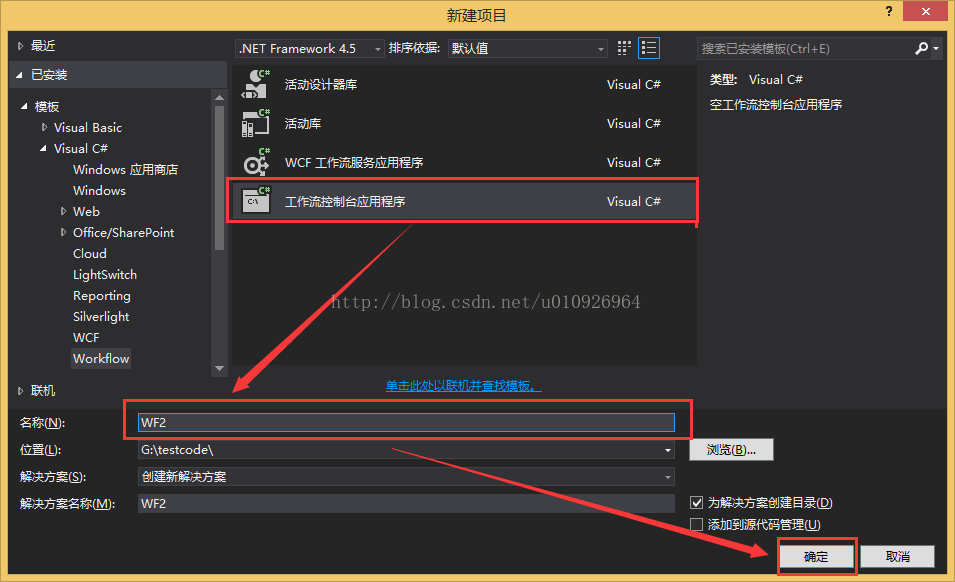
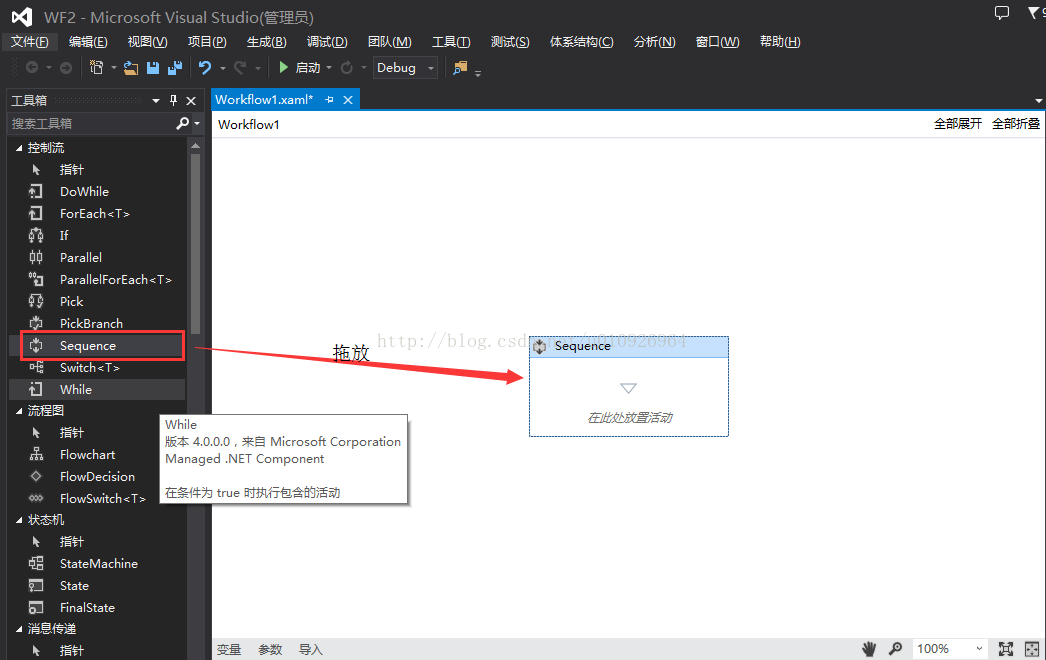 ## 3. Drag and drop a Delay component in Sequence to delay the time, set the delay to 10s
## 3. Drag and drop a Delay component in Sequence to delay the time, set the delay to 10s
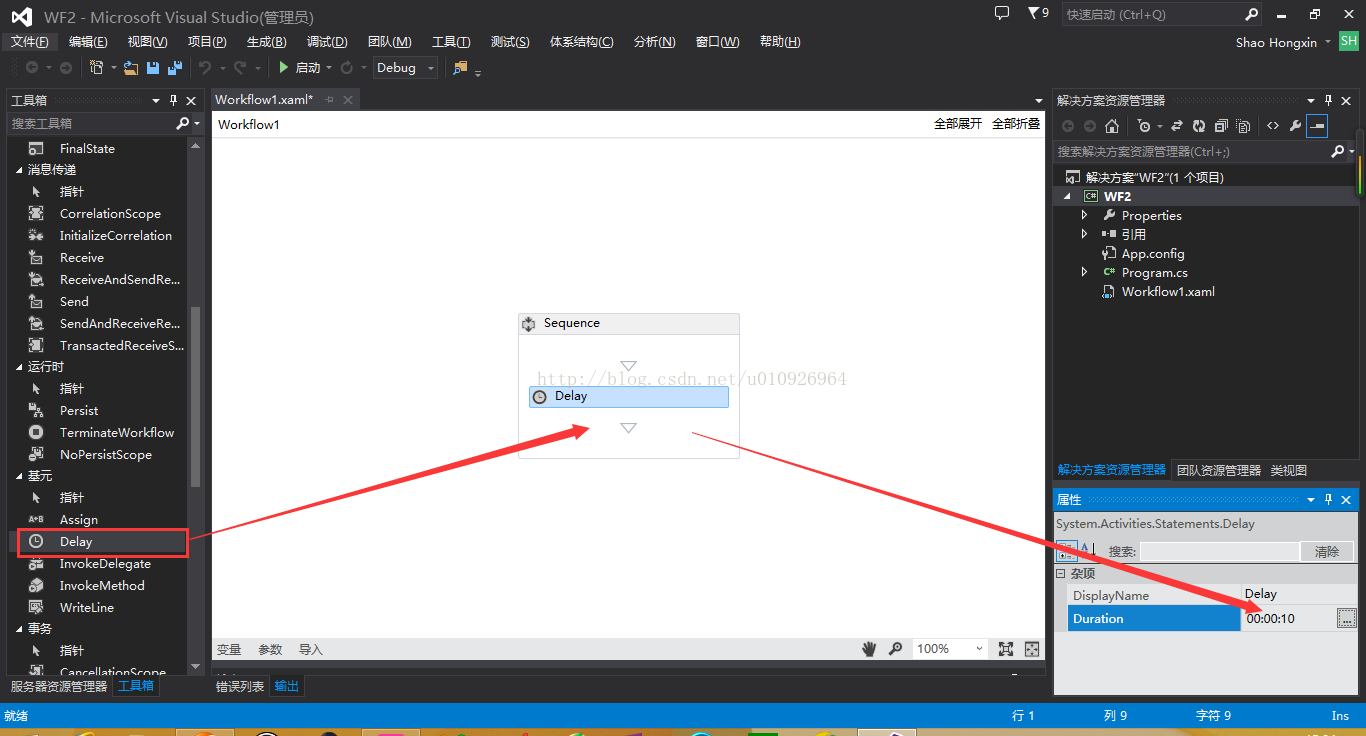 4. Drag and drop another active node "WriteLine" below Dealy to output helloWord
4. Drag and drop another active node "WriteLine" below Dealy to output helloWord
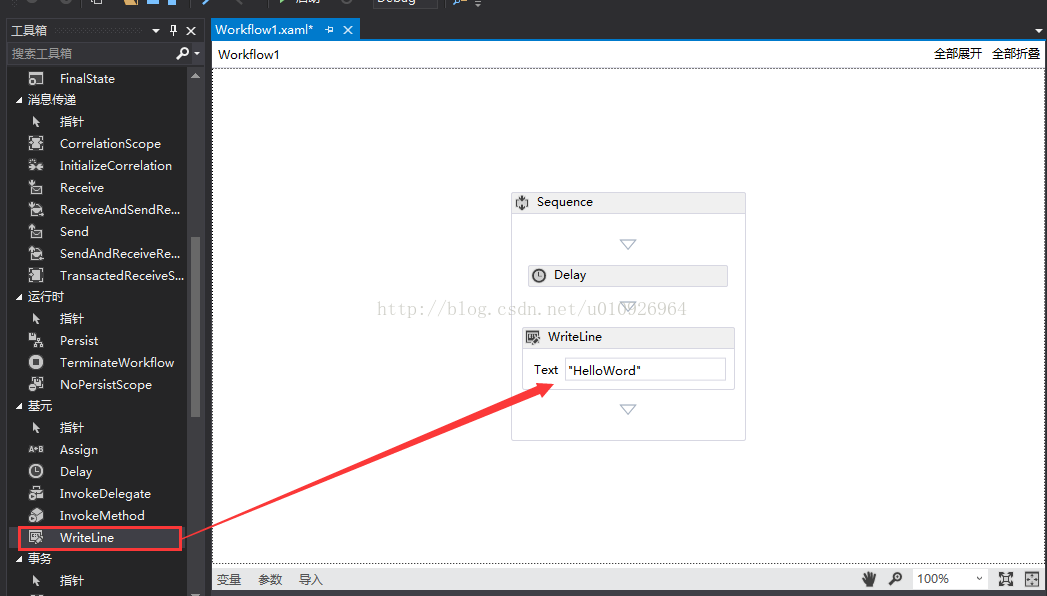 5. At this point, the basic controls have been dragged and dropped, but In order to reflect the time difference, we add a "WriteLine" before Delay and after the output result to display the current system time
5. At this point, the basic controls have been dragged and dropped, but In order to reflect the time difference, we add a "WriteLine" before Delay and after the output result to display the current system time
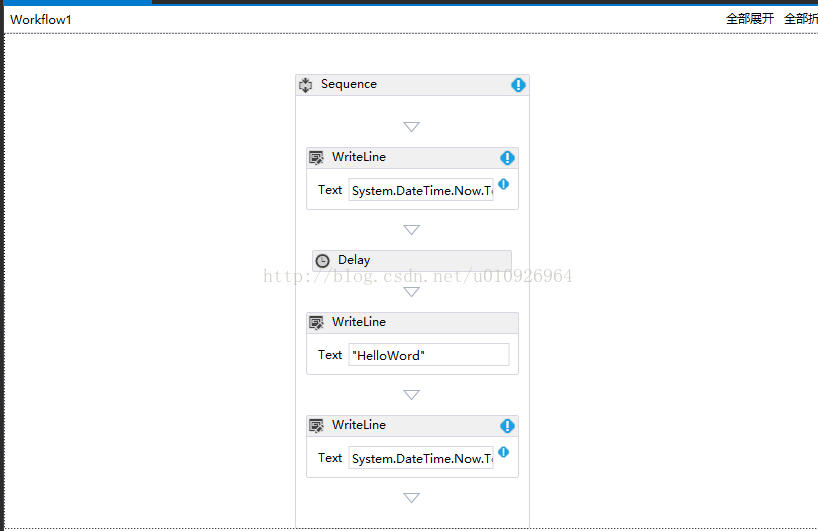 6. Host code (the code is quite simple after .NET4.0)
6. Host code (the code is quite simple after .NET4.0)
##
<span style="font-family:KaiTi_GB2312;font-size:18px;color:#666666;"><strong> class Program
{
static void Main(string[] args)
{
WorkflowInvoker.Invoke(new Workflow1());
}
}</strong></span> 7. Output the result
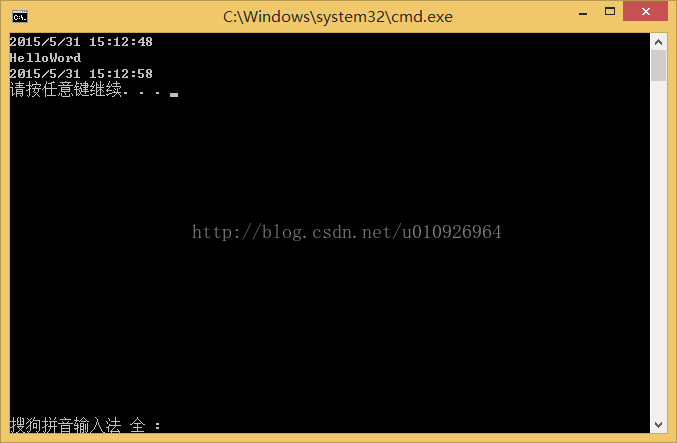 I have been exposed to workflow in projects before, but I only understand its ideas and have not personally practiced its specific usage. Here is just an entry-level small program, which is very simple. If you have a deeper understanding, I hope you can communicate at any time. Please criticize and correct any shortcomings.
I have been exposed to workflow in projects before, but I only understand its ideas and have not personally practiced its specific usage. Here is just an entry-level small program, which is very simple. If you have a deeper understanding, I hope you can communicate at any time. Please criticize and correct any shortcomings.
The above is the content of Getting Started with WF. For more related content, please pay attention to the PHP Chinese website (www.php.cn)!
##

Hot AI Tools

Undresser.AI Undress
AI-powered app for creating realistic nude photos

AI Clothes Remover
Online AI tool for removing clothes from photos.

Undress AI Tool
Undress images for free

Clothoff.io
AI clothes remover

AI Hentai Generator
Generate AI Hentai for free.

Hot Article

Hot Tools

Notepad++7.3.1
Easy-to-use and free code editor

SublimeText3 Chinese version
Chinese version, very easy to use

Zend Studio 13.0.1
Powerful PHP integrated development environment

Dreamweaver CS6
Visual web development tools

SublimeText3 Mac version
God-level code editing software (SublimeText3)

Hot Topics
 1386
1386
 52
52
 What is the role of char in C strings
Apr 03, 2025 pm 03:15 PM
What is the role of char in C strings
Apr 03, 2025 pm 03:15 PM
In C, the char type is used in strings: 1. Store a single character; 2. Use an array to represent a string and end with a null terminator; 3. Operate through a string operation function; 4. Read or output a string from the keyboard.
 How to handle special characters in C language
Apr 03, 2025 pm 03:18 PM
How to handle special characters in C language
Apr 03, 2025 pm 03:18 PM
In C language, special characters are processed through escape sequences, such as: \n represents line breaks. \t means tab character. Use escape sequences or character constants to represent special characters, such as char c = '\n'. Note that the backslash needs to be escaped twice. Different platforms and compilers may have different escape sequences, please consult the documentation.
 How to use various symbols in C language
Apr 03, 2025 pm 04:48 PM
How to use various symbols in C language
Apr 03, 2025 pm 04:48 PM
The usage methods of symbols in C language cover arithmetic, assignment, conditions, logic, bit operators, etc. Arithmetic operators are used for basic mathematical operations, assignment operators are used for assignment and addition, subtraction, multiplication and division assignment, condition operators are used for different operations according to conditions, logical operators are used for logical operations, bit operators are used for bit-level operations, and special constants are used to represent null pointers, end-of-file markers, and non-numeric values.
 The difference between char and wchar_t in C language
Apr 03, 2025 pm 03:09 PM
The difference between char and wchar_t in C language
Apr 03, 2025 pm 03:09 PM
In C language, the main difference between char and wchar_t is character encoding: char uses ASCII or extends ASCII, wchar_t uses Unicode; char takes up 1-2 bytes, wchar_t takes up 2-4 bytes; char is suitable for English text, wchar_t is suitable for multilingual text; char is widely supported, wchar_t depends on whether the compiler and operating system support Unicode; char is limited in character range, wchar_t has a larger character range, and special functions are used for arithmetic operations.
 The difference between multithreading and asynchronous c#
Apr 03, 2025 pm 02:57 PM
The difference between multithreading and asynchronous c#
Apr 03, 2025 pm 02:57 PM
The difference between multithreading and asynchronous is that multithreading executes multiple threads at the same time, while asynchronously performs operations without blocking the current thread. Multithreading is used for compute-intensive tasks, while asynchronously is used for user interaction. The advantage of multi-threading is to improve computing performance, while the advantage of asynchronous is to not block UI threads. Choosing multithreading or asynchronous depends on the nature of the task: Computation-intensive tasks use multithreading, tasks that interact with external resources and need to keep UI responsiveness use asynchronous.
 How to convert char in C language
Apr 03, 2025 pm 03:21 PM
How to convert char in C language
Apr 03, 2025 pm 03:21 PM
In C language, char type conversion can be directly converted to another type by: casting: using casting characters. Automatic type conversion: When one type of data can accommodate another type of value, the compiler automatically converts it.
 What is the function of C language sum?
Apr 03, 2025 pm 02:21 PM
What is the function of C language sum?
Apr 03, 2025 pm 02:21 PM
There is no built-in sum function in C language, so it needs to be written by yourself. Sum can be achieved by traversing the array and accumulating elements: Loop version: Sum is calculated using for loop and array length. Pointer version: Use pointers to point to array elements, and efficient summing is achieved through self-increment pointers. Dynamically allocate array version: Dynamically allocate arrays and manage memory yourself, ensuring that allocated memory is freed to prevent memory leaks.
 How to use char array in C language
Apr 03, 2025 pm 03:24 PM
How to use char array in C language
Apr 03, 2025 pm 03:24 PM
The char array stores character sequences in C language and is declared as char array_name[size]. The access element is passed through the subscript operator, and the element ends with the null terminator '\0', which represents the end point of the string. The C language provides a variety of string manipulation functions, such as strlen(), strcpy(), strcat() and strcmp().




